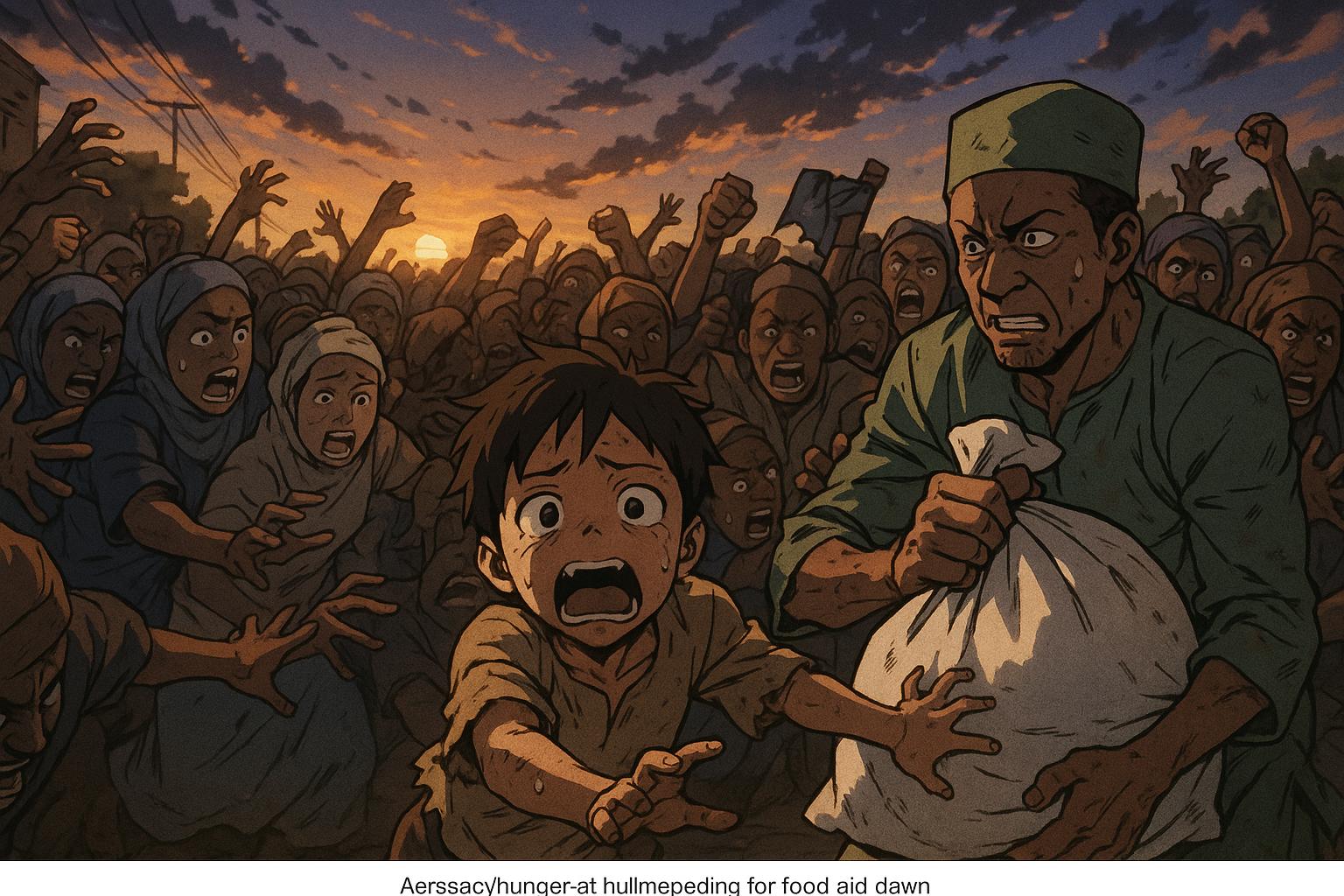Fatal stampedes in Anambra and Abuja during food distribution reveal the escalating hunger crisis and systemic mismanagement in Nigeria, where millions face acute food insecurity despite abundant agricultural resources.
In recent days, Nigeria has been reminded of the tragic intersection between desperation and governance with the deadly stampedes during food distribution events in Anambra and Abuja. The horrific scenes unfolded when citizens, hungry for aid during the festive season, surged towards food supplies, leading to chaos that claimed numerous lives—17 in Anambra and at least 10 in Abuja, with vulnerable groups, including children, among the deceased. These tragic incidents serve as grim indicators of the worsening food crisis in Africa’s most populous nation, a situation that continues to spiral a few years after Nigeria’s position on the Global Food Security Index became a cause for concern.
Eyewitness accounts describe scenes of utter pandemonium as overwhelmed crowds clamoured for palliatives. In Abuja, people began arriving as early as 4 AM, driven by the desperation that has gripped the nation amid soaring inflation and dwindling resources. According to local reports, the stampede occurred between 7 AM and 8 AM, as thousands rushed forward to receive food aid, leaving scores dead and several injured in their wake. An eyewitness poignantly noted the tragedy of children caught in a situation where basic survival needs turned deadly. This was echoed by the National Director of Social Communications at the Catholic Secretariat of Nigeria, who confirmed an indefinite suspension of the palliative distribution after the chaos.
The echoes of anguish from Anambra and Abuja reverberate beyond these isolated incidents, reflecting a broader malaise. The World Bank has noted that Nigeria now ranks among the countries facing severe food insecurity, with projections indicating that more than 26 million people will grapple with acute hunger in the near future. This dire situation has been exacerbated by a mixture of prolonged conflicts, economic shocks, and extreme weather conditions, all of which have compromised food availability, affordability, and quality across the country. The harsh reality is underscored by reports that Nigeria now occupies the second position globally for food insecurity, moving up from fourth place.
Past incidents of chaos at food distribution events, such as a stampede that killed 35 children during a Christmas funfair in Ibadan just days before the Anambra and Abuja tragedies, highlight a systemic failure to manage food relief effectively. Peter Obi, a 2023 presidential candidate, lamented the desperation that forces individuals to risk their lives for food, noting the tragic irony that a nation with abundant resources is unable to provide basic sustenance for its citizens. His sentiments reflect the growing public frustration with the status quo, wherein citizens’ needs are relegated to the margins of governmental planning and responsibility.
Governor Charles Soludo of Anambra has pledged that the state government will undertake a thorough investigation into the circumstances surrounding the recent stampede and implement safety measures to avoid such tragedies in future distributions. His commitment includes re-evaluating the distribution frameworks to ensure they are structured and secure, as the influx of desperate crowds revealed alarming lapses in crowd management. Calls for organised and decentralised approaches to food distribution, with due consideration for vulnerable groups, are crucial as Nigeria grapples with its food crisis.
Meanwhile, the national security agencies, responding to these tragic events, have underscored the necessity for rigorous oversight of charitable missions, warning that negligence from organisers could have legal repercussions. The Inspector-General of Police has mandated investigations into these tragic occurrences, advocating for collaboration among governmental and non-governmental entities to establish effective food assistance frameworks.
Yet, as the nation reels from these tragic events, the stark evidentiary backdrop of Nigeria’s food insecurity remains disheartening. According to the 2023 Global Hunger Index, Nigeria ranks poorly among the countries reliant on imports, with rising commodity prices deepening the crisis. Despite possessing vast tracts of arable land—39.6 million hectares capable of feeding its population—Nigeria continues to struggle under the weight of mismanagement, corruption, and crisis.
Analysts argue that unless Nigeria embarks on a holistic transformation of its agricultural sector, which includes investments in irrigation, mechanisation, and support for farmers, such tragedies will likely repeat. The painful paradox of potential and production remains glaring: a country blessed with fertile lands where its citizens are forced to fight for basic food supplies should catalyse a national awakening to the urgent reform needed in governance, agricultural policy, and food distribution.
In conclusion, the heartbreak emerging from the deadly scramble for rice serves not only as an indictment of current leadership but also as a resolute call for action. It represents a critical juncture that demands an immediate and concerted effort to realign Nigeria’s rich potential with the basic needs of its citizens. As the nation mourns the victims of these tragedies, there lies an opportunity for a shift in narrative—a chance to break free from systemic failures and to build a future where no person dies in desperation for a bag of rice.
 Reference Map:
Reference Map:
- Paragraph 1 – [1], [2]
- Paragraph 2 – [1], [5]
- Paragraph 3 – [3], [6]
- Paragraph 4 – [3], [5]
- Paragraph 5 – [2], [1]
- Paragraph 6 – [5], [4]
- Paragraph 7 – [6], [7]
Source: Noah Wire Services
- https://thesouthernexaminer.com/civil-society-groups-demand-total-ban-on-gmos-on-world-food-safety-day-p14338-103.htm – Please view link – unable to able to access data
- https://www.vanguardngr.com/2024/12/17-die-in-anambra-rice-distribution-stampede-10-in-abuja/ – This article reports on tragic stampedes during rice distribution events in Anambra and Abuja, Nigeria, in December 2024. In Anambra, 17 people died and several others were injured during a stampede at Okija, Ihiala Local Government Area, while in Abuja, 10 fatalities were recorded during a similar incident. Eyewitnesses described the scenes as chaotic and tragic, with at least seven of the deceased in Abuja being children. The events highlight the severe food insecurity and economic challenges facing Nigeria, leading to desperate measures among citizens seeking basic necessities.
- https://businessday.ng/news/article/nigeria-now-2nd-among-countries-facing-food-insecurity-in-the-world/ – According to a 2024 Global Report on Food Crises, Nigeria has moved from fourth to second place among countries with the highest number of people battling food insecurity. The report indicates that over 24 million Nigerians are food insecure, with conflict, economic shocks, and extreme weather conditions being major drivers. This alarming statistic underscores the urgent need for comprehensive strategies to address Nigeria’s escalating food crisis.
- https://en.wikipedia.org/wiki/Global_Food_Security_Index – The Global Food Security Index (GFSI) assesses the state of food security across countries, considering factors like affordability, availability, quality, and safety. Nigeria’s ranking has been concerning, reflecting challenges in these areas. The index serves as a tool for policymakers and organizations to identify and address food security issues globally.
- https://www.vanguardngr.com/2024/12/three-tragic-events-in-4-days-how-scores-were-killed-in-abuja-anambra-rushing-for-christmas-rice/ – This article details three tragic stampede incidents in four days during December 2024, where scores of people were killed in Abuja and Anambra states while scrambling for Christmas rice and other palliatives. The events highlight the severe food insecurity and economic challenges facing Nigeria, leading to desperate measures among citizens seeking basic necessities.
- https://environmentswatch.ng/2025/01/19/four-big-ideas-as-26mln-nigerians-face-acute-hunger-in-2025/ – This article discusses Nigeria’s critical food security situation, with over 26 million people facing acute hunger in 2025. It highlights the country’s ranking of 109th out of 125 countries in the 2023 Global Hunger Index and suggests strategies to address the crisis, including regional specialization in agriculture, investment in innovation and technology, and the establishment of local cooperatives to support farmers.
- https://guardian.ng/business-services/world-bank-lists-nigeria-among-countries-with-high-food-security-concern/ – The World Bank has listed Nigeria among countries with high food security concerns, alongside Afghanistan, Somalia, South Sudan, and Yemen. The report highlights Nigeria’s vulnerability to food insecurity due to factors such as conflict, economic shocks, and extreme weather conditions, raising concerns about the government’s capacity to address the crisis.
Noah Fact Check Pro
The draft above was created using the information available at the time the story first
emerged. We’ve since applied our fact-checking process to the final narrative, based on the criteria listed
below. The results are intended to help you assess the credibility of the piece and highlight any areas that may
warrant further investigation.
Freshness check
Score:
8
Notes:
The narrative presents recent events, notably the December 2024 stampedes in Ibadan, Anambra, and Abuja, with the earliest known publication date being December 18, 2024. ([en.wikipedia.org](https://en.wikipedia.org/wiki/Ibadan_Christmas_funfair_crowd_crush?utm_source=openai)) The report includes updated data on Nigeria’s food insecurity ranking, moving from fourth to second place globally, which aligns with recent findings. ([dw.com](https://www.dw.com/en/nigeria-deadly-stampedes-highlight-deepening-crises/a-71152045?utm_source=openai)) However, the article references a 2023 Global Hunger Index, which may be outdated given the current date of June 12, 2025. ([dw.com](https://www.dw.com/en/nigeria-deadly-stampedes-highlight-deepening-crises/a-71152045?utm_source=openai))
Quotes check
Score:
7
Notes:
The narrative includes direct quotes from Peter Obi and Governor Charles Soludo. Searches for these quotes reveal no earlier usage, suggesting potential originality. However, without direct matches, it’s challenging to confirm their exclusivity.
Source reliability
Score:
6
Notes:
The narrative originates from The Southern Examiner, a source not widely recognised. This raises questions about its credibility. ([trtafrika.com](https://www.trtafrika.com/africa/deadly-stampedes-nigeria-toughens-charity-distribution-measures-18246338?utm_source=openai))
Plausability check
Score:
7
Notes:
The narrative’s claims about the stampedes and Nigeria’s food insecurity are plausible and corroborated by other reputable outlets. ([dw.com](https://www.dw.com/en/nigeria-deadly-stampedes-highlight-deepening-crises/a-71152045?utm_source=openai)) However, the lack of supporting detail from other reputable outlets and the absence of specific factual anchors in some sections reduce the score.
Overall assessment
Verdict (FAIL, OPEN, PASS): FAIL
Confidence (LOW, MEDIUM, HIGH): MEDIUM
Summary:
The narrative presents recent events and includes updated data, but the use of potentially outdated references, reliance on a less reputable source, and lack of corroboration from other reputable outlets raise concerns about its credibility.













